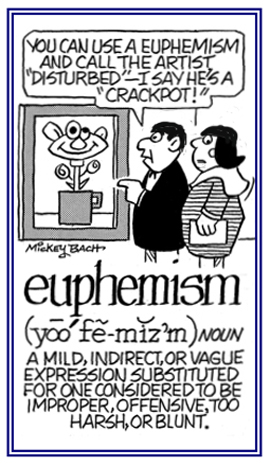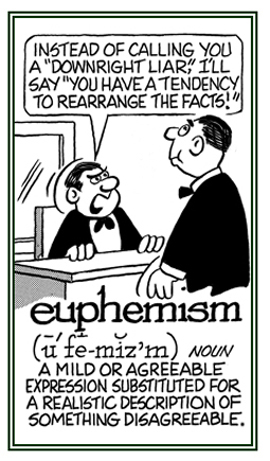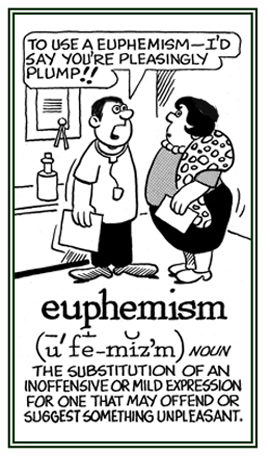You searched for:
“euphemism”
cacophemism, dysphemism, euphemism
cacophemism (kuh KAH fuh mizm") (noun)
Relating to harsh discordant sounds, words, or phrases: During the radio programs by the talk-show hosts, the reporter noted that they overused one cacophemism after the other, as they used many rough and harsh expressions.
dysphemism (dis FEM izm) (noun)
1. The deliberate substitution of an offensive expression for a neutral one: Wade's speech included a dysphemism followed by others as he uttered "killed" and "died" or "dead" when referring to his wife's mother.
2. Disordered phonation (producing vocal sounds), articulation, or hearing resulting from emotional or mental deficits: Seth's stuttering was an example of dysphemism.
2. Disordered phonation (producing vocal sounds), articulation, or hearing resulting from emotional or mental deficits: Seth's stuttering was an example of dysphemism.
euphemism (YOO fuh miz" uhm) (noun)
Use of a mild, neutral, evasive, or vague term in place of one considered taboo, offensive, blunt, or unpleasant: When Stuart referred to his vocation or job, he described himself with the euphemism "sanitation worker" instead of using the term "garbage collector".
Her friend, John, was prone to using a euphemism from time to time; such as, describing himself as a musician when in fact he just hummed when he was working; however, when he was writing, he would frequently use a dysphemism; such as, "&!#@**%" (translation: "damn") instead of saying the individual was upset.
He rationalized his decisions by citing the use of cacophemism as a legitimate writer’s tool.
This entry is located in the following unit:
Confusing Words Clarified: Group C; Homonyms, Homophones, Homographs, Synonyms, Polysemes, etc.
(page 1)
1. A mild or pleasant word, or phrase, which is used in place of one that might be considered too direct, too harsh, too unpleasant, or too offensive: One example of a euphemism is to use "eliminate" instead of "kill".
2. The use of a word, or phrase, that is more neutral, vague, or indirect to replace a direct, harsh, unpleasant, or an insulting term: Instead of Gordon saying that his wife was just too fat, he used a euphemism mentioning that she just had a lot of “love handles”!

© ALL rights are reserved.

© ALL rights are reserved.

© ALL rights are reserved.
Go to this Word A Day Revisited Index
2. The use of a word, or phrase, that is more neutral, vague, or indirect to replace a direct, harsh, unpleasant, or an insulting term: Instead of Gordon saying that his wife was just too fat, he used a euphemism mentioning that she just had a lot of “love handles”!



Go to this Word A Day Revisited Index
so you can see more of Mickey Bach's cartoons.
This entry is located in the following units:
eu-
(page 3)
-ism, -ismus
(page 21)
-phemia, -phemic, -phemism, -pheme, -phemy
(page 2)
Word Entries at Get Words:
“euphemism”
euphemism (s), euphemisms
1. A word or expression that some people use when they want to talk about something unpleasant or embarrassing without mentioning the thing; or an inoffensive expression that is substituted for one that is considered offensive.
2. A word or phrase that is more neutral, vague, or indirect to replace a direct, harsh, unpleasant, or offensive term.
3. Nice ways to say bad or vulgar things.
2. A word or phrase that is more neutral, vague, or indirect to replace a direct, harsh, unpleasant, or offensive term.
3. Nice ways to say bad or vulgar things.
This entry is located in the following unit:
euphemisms and additional doubletalk
(page 1)
The use of a more acceptable or agreeable word or comment instead of one that is considered to be offensive or too blunt and harsh. (3)
This entry is located in the following unit:
Word a Day Revisited Index of Cartoons Illustrating the Meanings of Words
(page 36)
